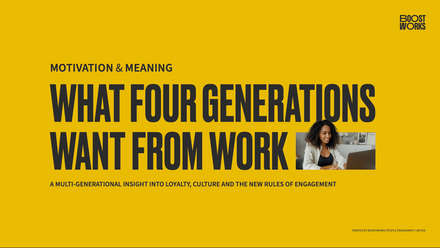Manuelle Malot on how young talent is demanding a more personal approach to work

Until 2030, the number of skilled jobs required by the global economy will exceed the number of available candidates. So what should firms be doing to attract the best young talent?
Personalisation and feeling valued as an individual is of central importance, and that starts during the application process. Young graduates want a personalised "candidate experience" that encourages them to get involved with a company that will make them feel "unique".
Social networks have an impact on young talent’s decision-making before they even apply for a job. It makes it easy to cross-check that the promises a company makes against the reality experienced by young graduates already employed there. The experts here are their ex-peers.
Eighty per cent of young people research a company’s culture before applying, and 78 per cent believe that culture influences their decision to apply. Aspects of business life, such as a corporate social responsibility statement, are highly valued.
In a globalised, fluid and graduate-friendly job market, employer brands need to be creative, proactive and sincere in order not only to attract and recruit but also to retain and engage these talents.
When it comes to reward - both monetary and non-financial – what appeals to younger workers? And, do employers need to review the way they reward staff to attract those employees? While all graduates are individual and will have their own priorities when it comes to what they value in a reward offering, transparency and personalisation are both essential. Here are four key considerations:
- A highly paid position isn’t enough. Young graduates want their work to be a source of fulfilment, an opportunity to take up challenges, an opening to the world. They want to learn, to develop, to experiment and to have impact. They are looking for an exciting, entrepreneurial and meaningful adventure.
- As such, simply offering regular pay rises may not necessarily be the best strategy because it doesn’t match graduates’ main driving force. Companies must take into account the aspirations and behaviours of this new generation of talent when developing a reward strategy for them - even if those aspirations are sometimes paradoxical.
- Young graduates expect recognition for their performance on merit. This recognition includes a fair, transparent salary but also the opportunity to develop their skills, which should be part of any broader reward offering for them. Skills development is the primary career objective for half of young graduates. It’s also important to create the opportunity for young workers to participate in decision making and goal setting and to evolve in a collegial and friendly environment. “Fast track” or “rotational programmes” can support early career development that allows younger workers to develop and take up challenges that have impact and meaning.
- Large companies are not only competing with each other to recruit the best talent, they are also competing with the entrepreneurial drive of young people who are creating or joining ‘human-sized’ organisations and start-ups, to learn more, learn it faster and to grow personally. However, large companies have some specific attributes that they can capitalise on, such as collective dynamics and the ability to learn from other employees. Effective management is an important aspect of this, with plenty of positive and negative feedback that develops young workers.
Manuelle Malot is director of EDHEC Business School’s NewGenTalent centre. She is a specialist in graduate recruitment and career management.






